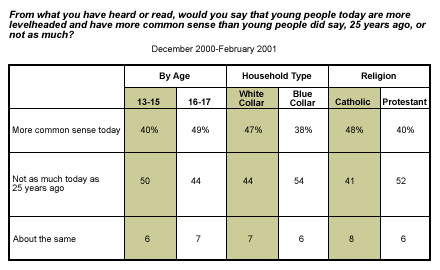Thousands of onlookers gathered along the streets of Ann Arbor, Mich., on April 17, to watch University of Michigan students perform their annual rite of spring -- the Naked Mile run. Many were disappointed. In past years, the event -- which first took place in 1986, and which university officials have historically condemned as illegal and dangerous -- has drawn hundreds of runners in the buff. Participation has steadily declined in recent years; this year, only about 20 runners showed up, and most of them ran in their underwear.
Whatever the reason for the decline of the Naked Mile, it suggests the question: Is the current generation of young adults more sensible than they're often given credit for? The answer depends on whom you ask. When asked in a 2000 Gallup Youth Survey* if, "young people today are more levelheaded and have more common sense than young people did, say, 25 years ago, or not," teens are evenly divided on the issue -- 44% said yes and 47% said no.

But when adults were asked the same question in October 2000**, they did not equivocate. A solid majority, 66%, said that young people today do not have as much common sense as those 25 years ago, and 12% said that young people's amount of common sense has stayed about the same. Only 19% said that young people today are more sensible than those of the previous generation. Adult confidence in the sensibility of modern youth seems to have decreased drastically in the past 50 years. When Gallup asked the same question in 1949, 42% of adults said young people today are more levelheaded than those of the past.
Many Gallup Youth Surveys appear to support the idea that teens today are more sensible than teens in the 1970s. As has been previously reported (see Related Items at right), the percentage of high school teens who smoke cigarettes, drink alcohol and experiment with marijuana has declined dramatically over the last two decades -- as much as 50% in each of the categories. Sixty-three percent (63%) of teens today plan to attend college full time, compared to only 46% of teens in 1983. And today's high school teens would prefer to be known as the "top student in their class" rather than a jock or the best-looking boy or girl.
As for the University of Michigan students who chose not to run the Naked Mile (or at least decided to don underwear beforehand) -- their decision may have had as much to do with the university's weeks-long campaign to discourage students from running as it did with the very sensible fear of being groped, videotaped, arrested or worse -- reported to their parents.
*Findings for teens are based on telephone interviews with a representative national sample of 501 teen-agers, aged 13 to 17, conducted December 2000 through February 2001. For results based on this sample, one can say with 95% confidence that the margin of sampling error is ±5%.
**Findings for adults are based on telephone interviews with a representative sample of 1,004 adults, 18 years and older, conducted in October 2000. For results based on the total sample of national adults, one can say with 95% confidence that the margin of sampling error is ±3%.